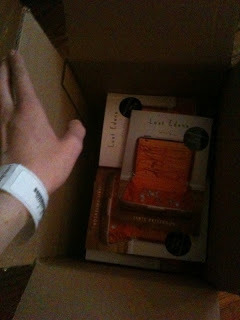Jamie Patterson's Blog, page 39
May 15, 2011
Letting go of Text
My book, Lost Edens , is publishing at right around 45,000 words. At one point, it was a 90,000 word manuscript. Yep, that's right. I cut it in half for publication. I had a wonderful early, early reader, Laurel Walsh, who told me that the story that needed to be told didn't need so many words.
So, how do you know when to let go of words? I just started working out the first draft for a follow-up to Lost Edens and I realized that I was taking a ton of time setting scenes instead of cutting to the main action. Once I cut out three pages of text I was able to get directly to the point of the scene. So here's my writing tip: practice cutting text. Here's my writing advice: never get too attached to any particular collection of words.
Here's how to practice:
Write out your day, step by step. Describe the scene as you woke up, moved through the day, each and every interaction with other people, what you wore, what you ate. Practice writing out really intense detail from the start of your day to where you are in the day as you write.
Set this aside.
Then, go through and determine the highlight of the day. What event or action could stand alone as a definition of the day? Try to delete and edit so that the day reduces to focus on just this one event or action.
And remember: don't be afraid to get rid of text. Write! Delete! Write again!
Really Good Reads: Let the Great World Spin
The story begins the morning of Philippe Petit's tightrope walk between the twin towers and from there twists and weaves the lives of the characters in unexpected ways. Lyrical and heartbreaking.
May 13, 2011
Percent or %
When to use the word percent and when to use the figure? This one is easy peasy.
Use the word percent in just two instances:
1. If it's on its own (we were looking for the percent of…)
2. If there is a number that precedes it that is the first word in a sentence (Four percent of the children liked chocolate).
Other than if the number is the first word in the sentence, percentages will always be figures. This means that, other than in the two situations above, you'll always use the symbol for percent.
Let's look at fo' real examples:
Only 1% of the population has a "genius" IQ, one of 140 or higher.
Thirteen percent of the world's population lives in deserts, which account for about one-third of the Earth's land surface.
Check out APA (sixth edition) p. 118 for the official rule.
Easy peasy!
Oprah and James Frey
When I read A Million Pieces I couldn't put it down. For me, I sure didn't care or think about the reality of it but let the text capture my imagination and take me on a ridiculously crazy ride. The voice was clear, the writing was sharp, the construction of the story flawless. I didn't feel as strongly about My Friend Leonard, but the writing in this sequel was equally as consistent, equally as captivating. I read both cover to cover and recommend both to anyone looking for a good, entertaining read. (I do not recommend it for someone hoping for a clear insight to addiction and recovery. We're strictly talking entertainment, here.)
I remember seeing Frey on the first Oprah show and really liking him. He seemed, heck, I'll say it: He seemed normal. I remember seeing him on Oprah the second time and just feeling really sorry for him. I thought Oprah was way, way out of line and I stopped watching her show for awhile.
At the time, I couldn't put a finger on why in this situation Frey seemed right and Oprah seemed wrong but over the years I've formulated a few theories. The first is the Olaudah Equiano theory.
Olaudah Equiano gained fame and fortune in the 18th century for telling his harrowing tale of coming to England on a slave ship after being kidnapped in Africa. In reality, there's a strong likelihood he never set foot in Africa and was, in fact, born in South Carolina. That is to say, I think the genre of memoir has always had varying degrees of truth but in Olaudah Equiano's case and in Frey's case, I don' t think The Truth is always necessary in order for truth to be revealed.
The second theory, which I believe to be proven true in the author interview at the back of Bright Shiny Morning, is the marketing theory.
The marketing theory is that A Million Pieces published at a time when memoir was publisher's gold. Even with what little experience and knowledge I had of the publishing world then, I knew enough to know an author publishing with Doubleday wasn't going to have much say in the marketing plan for the book.
The last thing isn't so much a theory but a belief that all good literature tells a story. Period. It isn't reporting, it isn't academic research, it's storytelling. My book, Lost Edens, is true to the point some of the dialogue is absolutely, verbatim, what was said in the moment. But it's still just a story. As the Tracy Chapman song goes,
There is fiction in the space between
The lines on your page of memories
Write it down but it doesn't mean
You're not just telling stories
Frey told a heckuva entertaining story and I can't wait until Monday where I think an apology from Oprah is imminent and, even more importantly, there will be discussion about the blurred lines between fiction and nonfiction. These lines will be sharpened or they will be lessened in importance. I really think it's just that epic. Why? Oprah drives marketing choices, which drives publishing choices, which determines what we read and how we read it.
Cannot wait.
t test, no Hyphen
If you're reading this then I have to say, congratulations. Your attention to detail goes way beyond most people's. Despite the fact that t-test (with a hyphen) is pervasive on the Internet a hyphen is not the rule but the exception.
You'll use t test (italicized t, no hyphen) as the standard.
Use t-text (italicized t, with hyphen) as an adjective.
For example:
The hypotheses will be tested utilizing multiple regression and t tests.
The value of the t-test statistics…
See APA (sixth edition) p. 121 for the rule then go feel really good about yourself and your fine attention to detail.
Galleys Part 2
But this gives me a chance to post "picture of galleys part 2," which includes the hospital wristband I got after getting three stitches just a few inches above my knee. When I was opening this very box the scissors found their way right into my leg (dang!). Not exactly the souvenir from the moment I would have asked for, but c'est la vie.
Just six more copies to send out! I've never been to the post office this much in a 24 hour period in my life.
Cannot vs. Can not
You'll use cannot when can is an absolute impossibility. For example:
I cannot go to the party in Minneapolis in an hour because I am currently in Virginia.
You'll use can not (two words or can't) when can is a possibility. For example:
I can not go to the store now, but I can in an hour.
Also: I can't go to the store now, but I can in an hour.
Now you know which wins when with cannot vs. can not.
May 12, 2011
Really Good Read: Let the Great World Spin
I'm not a huge fan of rereading books (there's so much out there to read!) but I think I'll wait long enough to forget details of this one and read it again. Set in the 1970s the story begins the morning of Philippe Petit's tightrope walk between the twin towers and from there the story twists and turns, bringing characters together in unexpected ways. I think I read somewhere that this book is one of the best love stories written for the city of New York by a foreigner. Couldn't agree more.
I Hate Roller Bags
That's the philosophical reason (which I totally believe, by the way). The fact that people dragging a roller bag expand to take up 3 times the amount of space, get onto escalators with the bag next to them to block passage for everyone else, or insist on forcing this (usually) oversized bag into a tiny overhead bin sure does bother me, too.
Back to the philosophical reasons: there's a beautiful character, May, in The Secret Life of Bees who writes down whatever pain she is carrying and stuffs it into a wall so the wall could carry the burden for her.
I thought this was a perfect description of every writer I've ever met. We each have our own version of a wailing wall where we can write down what's affecting us and leave it (ideally, that is--for the sake of a neat conclusion let's not talk about what happens to May). This writing rarely results in an actual book but in my case, with Lost Edens, it does.
I've started to send out the advance reading copies to people who appear in the book and I've found myself including notes that ask them to please know that I have a really wonderful life, that the events in the book were a long time ago now, and that the person in the pages isn't the same person who is here now. That's probably true for them, too.
After getting back from the post office just now I felt so much lighter without the boxes and envelopes that I had brought out the door with me. This is what reminded me of my complete distaste for all luggage that can't hang off a shoulder:
Don't take with you that which you cannot carry.
When to Spell out a Number
Spell out all numbers nine and lower.
(One, two, three, four, five, six, seven, eight, nine)
Use figures for all numbers 10 and higher.
10, 11, 12, 13......100...550....1,450...5,000
Once you hit something like 1 million, you can do a blend.
There are a ton of exceptions, though. For example, increments of time, percentages, and numbers that represent a place in a numbered series will all be figures.
5-years-old
2 hours ago
9%
Grade 3 (but note: third grade)
Likewise, all numbers that are the first thing in a sentence will be spelled out.
Twelve years ago I was in Kansas.
See APA pp. 111-114 for all the dirt!




